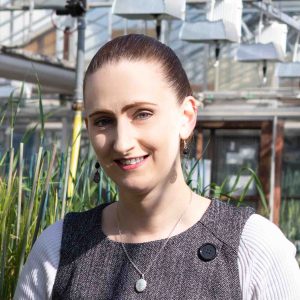Professor Diane Saunders
Head of Department Group Leader Delivering Sustainable Wheat (DSW), Advancing Plant Health (APH)
Diane’s lab focuses on investigating (re-)emerging plant pathogens that pose a significant threat to agriculture.
Her research group largely studies the wheat rust pathogens, which are known as the “polio of agriculture” and “cereal killers” due to the damage they have caused to wheat production ever since we started cultivating wheat over 10,000 years ago. Here, Diane is particularly interested in unlocking and harnessing the potential of the phenomenal recent advances in genomic-based approaches and molecular resources to finally wrestle the wheat rust fungi into submission.
Her team’s research includes numerous projects studying the wheat yellow rust pathogen, Puccinia striiformis f. sp tritici, that recently re-emerged as a major constraint on UK agriculture. Focusing on developing a better understanding of how specific host plants respond to pathogen invasion, the team have identified a series of new potential sources of wheat rust resistance.
Using innovative new genomics-based strategies developed in the lab, her team uncovered plant genes targeted by the wheat rust pathogens to support successful colonisation of wheat. Disrupting the function of several of these genes has shown that their function is essential for supporting wheat rust infection. Thus, her team are exploring how these genes could act as new potential targets for manipulation in wheat rust resistance breeding that could help in our battle to safeguard wheat yields from these notorious cereal invaders.
Diane’s team is especially well known for developing and deploying several pioneering techniques for pathogen surveillance; the revolutionary “field pathogenomics” and “MARPLE diagnostics” techniques. These new methods use the latest DNA sequencing technology to generate high-resolution data for describing the diversity in a pathogen population directly from infected field samples. This enables the lab to track and study pathogen dispersal on a national and international scale.
Working in partnership with her long-term collaborator Dr Dave Hodson at CIMMYT and collaborators across East Africa and South Asia, her team are working on integrating MARPLE diagnostics into national rust surveillance programmes to provide (for the first time) near real-time disease diagnostic capacity directly in these regions. This enables the spread of individual strains of the wheat rust pathogens to be tracked in real-time and, in turn, stakeholders to make immediate decisions regarding disease management within the current growing season.
Another focus area for Diane’s lab is evaluating the likely causes of recent re-emergence in Western Europe of wheat stem rust, caused by the fungal pathogen Puccinia graminis f. sp. tritici (Pgt). This includes unravelling the role of wild plants in the life cycle of the wheat rust pathogens in the UK and the influence of climate change on exacerbating wheat stem rust infections. Diane’s lab continues to make notable discoveries in this area that will aid wheat breeders regarding Pgt resistance breeding and assisting farmers and legislators in assessing the current local risk of inoculum sources to help bridle the onslaught of this formidable foe.
Diane is passionate about training the next-generation of plant scientists and with her team she regularly runs training courses and workshops internationally (particularly in bioinformatics) to empower early-career researchers in regions where tuition is limited. She is hugely passionate about promoting gender parity in wheat research, leading to her development of the Rosalind Franklin Women in Wheat mentoring programme that she pioneered and aims to provide targeted career development training for early-career female scientists at JIC, TSL and beyond.
Selected Publications
-
Corredor-Moreno P,Minter F,Davey PE,Wegel E,Kular B,Brett P,Lewis CM,Morgan YML,Macias Perez LA,Korolev AV,Hill L,Saunders D (2021)The branched-chain amino acid aminotransferase TaBCAT1 modulates amino acid metabolism and positively regulates wheat rust susceptibilityThe Plant CellPublisher's version: .
-
Radhakrishnan G. V., Cook N. M., Bueno V., Lewis C. M., Persoons A., Debebe Mitiku A., Heaton M., Davey P. E., Abeyo B., Alemayehu Y., Badebo A., Barnett M., Bryant R., Chatelain J., Chen X., Dong S., Henriksson T., Holdgate S., Justesen A. F., Kalous J., Kang Z., Laczny S., Legoff J., Lesch D., Richards T., Randhawa H. S., Thach T., Wang M., Hovmøller M. S., Hodson D. P., Saunders D. G. O. (2019)MARPLE, a point-of-care, strain-level disease diagnostics and surveillance tool for complex fungal pathogensBMC BiologyPublisher's version: .
